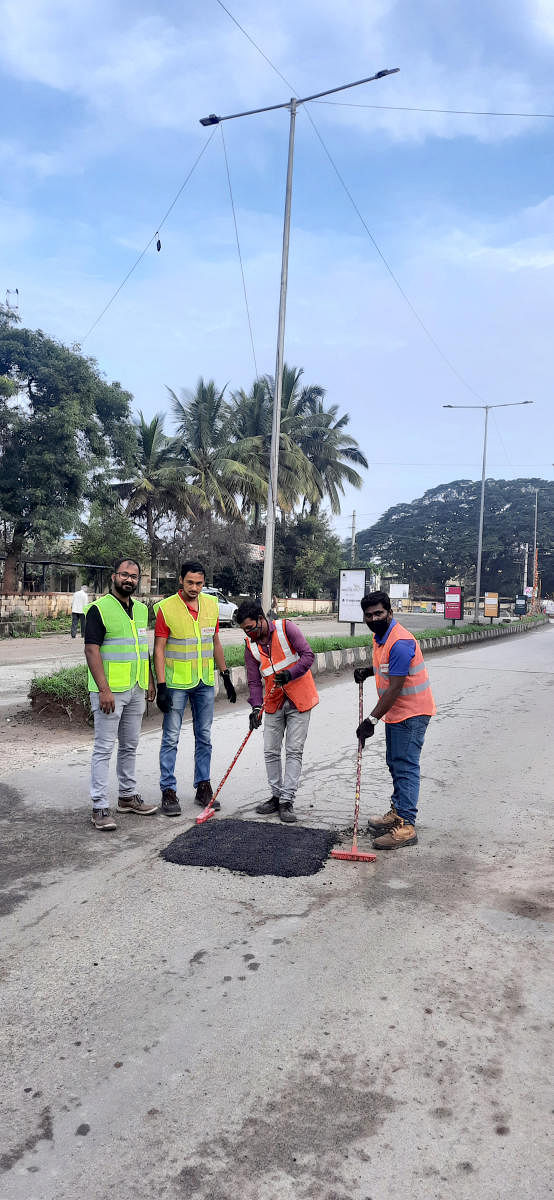
PotHoleRaja was started in 2016 in Bengaluru with the objective of ridding the city’s roads of potholes.
Five years down the line, this not-for-profit is filling potholes across 10 Indian cities.
The BBMP’s apathy in maintaining roads has led to accidents and deaths, but PotHoleRaja co-founder Sourabh Kumar would rather talk about what can be done in partnership with the civic authorities.
“Our focus is to find solutions and foster public-private collaboration. The authorities have supported us and given approvals to repair roads,” he says.
Calls from citizens to fix potholes spike every monsoon, climbing from five a day to 30. This year’s November showers have prolonged rain woes. “Could it be because of climate change?” he wonders.
What they do
PotHoleRaja mostly carries out road maintenance inside private properties like large hospitals, industrial campuses, gated communities, and universities and schools. Private owners pay for these repairs.
“We also fix public roads when people contact us. We fix them in two to three days if we have the funds. We use funds given by CSR partners or citizens,” he says.
A common complaint against the BBMP is that their pothole fixes come undone in no time.
“Hardly about 1% of our
pothole fixes have gone bad. These last six to eight months even if the drainage is not proper,” says Sourabh, attributing it to the cold asphalt mix their R&D team has made in consultation with experts.
Mats that make
roads stronger
A 12-member team from PotHoleRaja has now designed ‘GridMats’, a honeycomb structure recycled from polypropylene waste. This can go under the surface of the road as reinforcement to absorb and distribute the vehicular load evenly, or simply be used to lay temporary driveways. “When used with fillings, its load-bearing capacity is over 1,000 metric tonnes, equal to the weight of three Boeings,” says Sourabh. The Maharashtra State Innovation Society has selected PotHoleRaja to pilot these GridMats in Mumbai’s Ulhasnagar. “We will lay 700 to 1,000 sq mt of GridMats-based concrete roads there soon.” Has the Karnataka government shown interest? “We are in talks,” he says. Contact PotHoleRaja on 81476 84653, or via social media.
‘Follow IRC, you won’t see potholes’
Abhishek Mittal, principal scientist, Central Road Research Institute, Delhi
How do potholes develop?
It happens if substandard material is used, less bitumen is used in the mix, the pavement is not compacted tightly, or if the road thickness is enough to handle the anticipated traffic. As a result, water can seep through the material or cracks, loosening the internal structure and causing the road to sink in.
What is a good quality road?
According to the Indian Roads Congress (IRC), a road should be smooth, comfortable to ride on, impermeable, and structurally sound. IRC guidelines are on a par with international practice. So if roads in India are prone to potholes when compared to the US or UK, the authorities aren’t doing their part.
Are potholes inevitable?
If roads are built and maintained with IRC guidelines, you won’t see potholes. These include desilting the roadside drains, sealing cracks immediately, and laying a renewal coat when required.
‘Consult academics’
Ashish Verma, convenor of Indian Institute of Science’s Sustainable Transportation Lab, says pothole fixing is only a stopgap arrangement. If you don’t build cross slopes and drains along the edges to remove the rainwater, even the best of roads will develop potholes. “These are the basics of civil engineering,” he says and hopes that Indian civic authorities start consulting scientists and academics, which countries like Sri Lanka do.
BBMP’s take
Manjunath, BBMP assistant engineer, road infrastructure, blames construction material and debris dumped on the footpath for choking of drains and flooding in low-lying areas. “We have asked the contractors to store the construction material higher and store only what’s required at any given point,” he says. He says the BBMP plans to carry out white-topping and TenderSure projects in more areas to improve roads. “If the rains stop for a week, we can fix all potholes,” he claims.